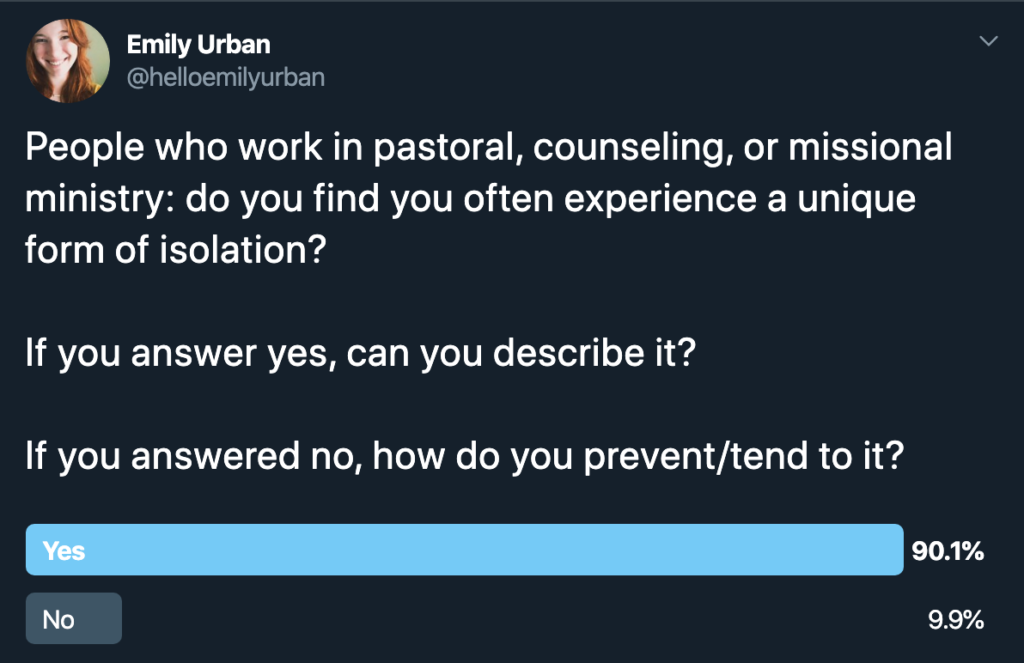

I sat with my plate on my lap, sipping punch from my glass, slowly shifting my gaze from the other people to looking at the wall and my feet, realizing the conversation was straying further and further from anything I could relate to. I could feel the circle almost closing me out, not intentionally, but with no intent of reopening.
It was a party for a bride-to-be. The marrieds talked on the couch about their sanctifying struggles in marriage, in learning to live with another sinner. The singles talked at the punch bowl about their jobs and church groups they led on Wednesday nights. A question occurred to me that has occurred to me before in my moments of self-psychoanalysis:
Have I become more introverted, or have I just become more adjusted to and comfortable with isolation?
It led to another question: in choosing the line of mission work, have I chosen my own fate of suffering a lack of community?
I used to be a very extraverted, social person. My mom even called me a social butterfly all through my childhood. I loved people, I loved group events, I loved high-energy scenarios. But as time wore on, and as I began to pursue evangelistic ministry over 3 years ago, I found myself less and less being able to connect with people. I was invited to less gatherings, and I soon saw in myself that I didn’t even desire to be invited sometimes. I preferred to stay home because going would mean scenarios like this: unsure of how to talk without risking sounding either self-righteous in the good seasons, or lamenting and seeking pity in the dark seasons. Unable to relate to the American dream struggles or American church ways. It just felt very foreign.
“There are some things I can’t even share with my wife because it could put her in a position where people want to find out information through her. And there’s no work-life separation,” my pastor said as we talked about this odd experience the next day. “It is your life.”
There is a unique type of isolation that ministry work – be it pastoral or missional – brings. Although it is not a bad isolation (as there is so much joy to be had in it), it is worth examining and handling with care by those within and without it.
They Might Be One of the Most Honest People They Know
Unholiness does not like to be exposed to holiness, and men and women working in ministry are sometimes given this reputation of being especially holy saints because of their line of work. As a result, the “common folk” often behave differently around them. (I have heard three pastors now say they do not mention their vocation when they introduce themselves for this reason.) They will speak of high and lofty things, slip in a note about their stellar church attendance and involvement record, and hide anything that could give a remote impression of worldliness about their lives, even things that are good gifts from God in this life.
It places these men and women in ministry in an awkward position. We know this isn’t the whole story, because no normal person talks of how spiritual they are in regular conversation. We know you aren’t that holy – and we know because neither are we. We are the common folk.
As a result, the connection is being developed between a human and the social-media-version human. Conversations become very limited and not wholly honest, which is not how the church was ever intended to be. The truth of the gospel is it levels the playing field – whether you are doing the faithful work of ministry or the faithful work of contributing to society, it is all made ordinary and extraordinary by the fact it is all accomplished by redeemed sinners wrestling the flesh in the fight of sanctification. For me personally, I have had times where I am eagerly waiting for the other shoe to drop – not because I delight to see the flaws and brokenness of an image-bearer revealed, but because I want to know you’re human, too, and be able to connect with you.
People in ministry find they themselves might be one of the most honest people they know, because they meet people who hide their humanness while they yearn for and offer transparency to break that notion they are extra-holy.
They Might Know But Not Be Known
Of course, there is the flip-side of this – rather than hide dirt, some see the person in ministry as the dirt-cleaner. The person becomes the burden-bearer of everything. To some degree, this is one of the things they signed up for in this decision to be in ministry. Their main goal is to show people Christ by relieving the burdens of those around them.
However, it’s not a two-way street. A person in ministry could be put in a room with every person they are in contact with, and chances are, they could share with you the heaviest burdens and deepest sins of the majority in the room, but very few (perhaps one or two) of the people in the room could tell you the burdens and sins of the person in ministry.
This is isolating for any human. Some people naturally fall into this even outside of ministry – think of the person who is the confidante, counselor, and just helper of your friend group. Without placing healthy limitations on yourself – or rather, without recognizing and heeding the natural limitations already placed on you as a human – being in this role quickly leads to loneliness and burnout. Jesus sets this precedent in Mark 1:35-38 and Luke 5:15-16 when He withdrew from everyone desiring His attention to pray. He even says in Mark 1:38, “Let us go on to the next towns, that I may preach there also, for that is why I came out,” telling us the most important matter was not to attend to every need, but to give the message that points to the One where needs are fulfilled.
You cannot thrive knowing everyone and remaining unknown – that is something only God can do. And even God Himself desires and makes an effort to be known (Psalm 27:8).
Another reality is that those who people in ministry come in contact with are not aware of the others this person is serving. This can lead to disappointment and worse in those who might desire more attention or expect particular service, which leads into the next point.
They Might Be Held To Impossible Standards
People in ministry must be held to a higher standard (James 3:1). However, sometimes we make the mistake of raising those in ministry to a standard that can only be met by God, or a god we have imagined for ourselves.
I carefully and lovingly told the young woman living with me that what she was doing was unwise according to the standard she herself confessed – God’s. She retaliated in angry words where not that long ago words of love for me flowed.
I unwisely shared my worries about the sins of another young woman to someone who in turn shared my words with her. She called me out, and I apologized, sincerely. She seemed to accept it at first, but then she slandered me behind my back, removed me from all social media, and used me as a reason to abandon her faith later.
People in ministry, when elevated to this extra-holy state, are sometimes assigned a divine level of expectation on how they are to act, be it as a god that appeases and supports every action as in my first example, or as the God who is without blemish and never does evil against us.
Because pastors, missionaries, and the like are not God, they are neither omnipotent, omniscient, or omnipresent. When those traits are desired of them, it leads to inevitable disappointment and sometimes other devastating effects. This is not always the fault of the person they are ministering to, as people in this position can often sell themselves as saviors, but the ministered setting them on a pedestal is an unfortunate reality that often occurs.
Their Interests And Experiences Are Kinda Weird
This is a quick one, but it matters – we make friends based on shared interests and experiences. In the words of C.S. Lewis:
“Friendship is born at that moment when one person says to another: ‘What! You too? I thought I was the only one.”
C.S. Lewis
People in ministry are wildly interested in their vocation – it’s one of the reasons they’re in it. God has placed in them a passion for what they do. So, if they are faithful livers and sharers of the Word, they will be excited about complex theologies and church history. They will have an odd interest in how people tick and discerning the nuances of their situations.
They will also have seen some terrible, traumatic things and things that cause elation because of their miraculous nature.
Like the example given in my introduction, this often makes it hard to have light, flowing conversation about much else. Often, when I have started sharing “what’s new” in my life, or try to relay the latest Hebrew theme I’ve delved into, the conversation quickly comes to a halt so abrupt, you can almost feel it. The extreme or odd nature the stories and interests sometimes possess make it difficult to resume pleasantries.
The Remedies
Thankfully, God does not leave those in ministry to suffer without oases and practices to prevent burnout.
In regards to the honesty issue, if you are in ministry, I encourage you to lead the conversation deeper. Humanize yourself and the other person by sharing with careful wisdom what you can about a struggle you are having, be it with sin or with circumstance, and ask them the hard questions to encourage transparency. (James 5:16)
If you are not in ministry, just know – we know you are human. And we want you to know we are, too, We love hearing your victories, but please do not share with the intent to protect us from your darker secrets. Just tell us about your life and interests and forget our vocations. We really need that. (2 Corinthians 1:12.)
In regards to the issue of knowing but not being known, if you are in ministry, seek peers who are strong in doctrinal training and maturity, both in and out of ministry, that you can have mutual give-and-take with. These are extremely rare and take time to discern who they are, but I have found them essential. I have made an effort to develop a close relationship with my pastor, some missionaries when they’re home on furlough, as well as a couple my age with the same spiritual priorities I have, and it has proven to be one of the greatest treasures I have. Consider carefully, too, who you take under your wing as people to be known by you. Contrary to popular belief, as exhibited by Jesus, not every person who crosses your path is sent to be closely ministered to by you. Some we have to consider redirecting to another who can serve them better (which also deepens the connection and life of the body when we encourage discipleship), and others we simply have to aid once and entrust to God.
If you are not in ministry, please consider that those who are may not be giving you a cold shoulder (1 Corinthians 13:7). They long to give you the love you need but might have their hands full. Take time also to pray for them and ask them how they are doing. You might not understand their struggles, but offer to be a refuge if you are in a place where you can be.
In regards to the issue of being deified, if you are in ministry, make your language one of humility and open repentance. Just as you show others their need of Christ, live it by speaking openly of your own. You are in this position of ministry because you know firsthand how desperately we need our Savior and because you want to make Him known. As John Piper points out, “You glorify your friend by needing him, and by asking him for help, and counting on him.” (He draws this notion primarily from John 15:5.)
If you are not in ministry, remind yourself, you are dealing with a human who seeks give special focus to sharing truth with you that saves – a human who will be faithful and wound your pride to see you healed, a human who will sometimes succumb to the same pride themselves (Proverbs 27:6).
In regards to the issue of a lack of shared experiences, if you are in ministry, find others in your line of work. Seek to form a bond with those who share your greatest passion. And in this age of social media, don’t be afraid to take advantage of this opportunity to connect worldwide.
If you are not in ministry, can I challenge you to see why your friends in ministry are so excited about Greek tenses or the passionate about the order of salvation? You might be surprised to find it makes a difference in your passion for God.
Thank God for a life of ministry, and the opportunities its unique isolation provides for sanctification and sacrificial love for one another.
[bctt tweet="Thank God for a life of ministry, and the opportunities its unique isolation provides for sanctification and sacrificial love for one another."]


